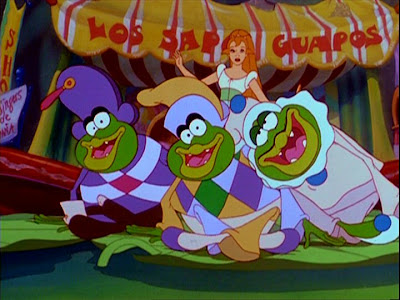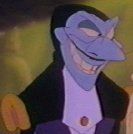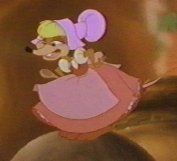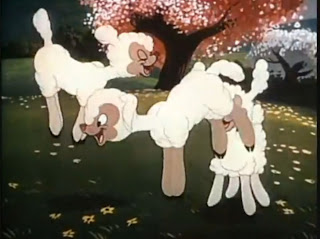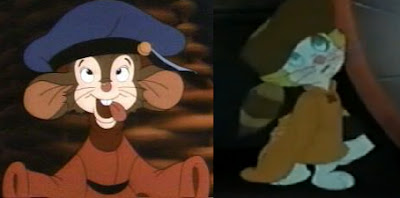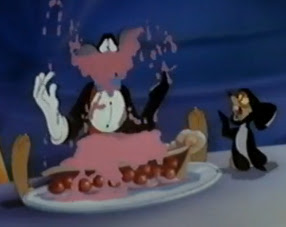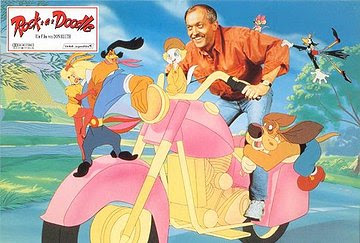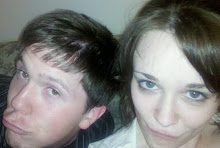Title: All Dogs Go to Heaven
Year: 1989
Rated: G
Run Time: 1 hour, 29 minutes
Starring
Burt Reynolds as Charlie B. Barkin
Dom DeLuise as Itchy Itchiford
Judith Barsi as Anne-Marie
Vic Tayback as Carface Carruthers
Charles Nelson Reilly as Killer
Loni Anderson as Flo
Loni Anderson as Flo
Melba Moore as Annabelle
Ken Page as King Gator
Plot:
Based on: Apparently an original screenplay.
Setting: New Orleans, Louisiana, 1939.
Tagline: But not all dogs stay there!
Andrew's First Viewing: First semester of sophomore year, fall 2007
Ken Page as King Gator
Plot:
Setting: New Orleans, Louisiana, 1939.
Tagline:
Andrew's First Viewing: First semester of sophomore year, fall 2007
Andrew's Comments
Unlike our previous two films (and, according to its VHS sales, a great many other kids who grew up in the 90’s), All Dogs Go to Heaven was never part of my film-watching repertoire. I first saw when my friends Lauren and Eugene were watching it it one night during my second year of college. I had heard of it prior to that, maybe saw some footage here and there, but left ultimately unimpressed by Don Bluth’s fourth major animated release (and first to be completed in his new animation studio in Ireland).
Perhaps it was the setting, perhaps it was the songs, but something about the film just didn’t grab me in any nostalgia-defying way (and since there was no nostalgia to defy, I was able to get the full brunt of what I thought was a very mediocre experience). Since then, I feel like my opinion of the movie has increased, though marginally.
The plot concerns Charlie B. Barkin (because apparently Charles Barkley was
Charlie arrives in heaven pissed off that he was killed, so he jacks the pocket watch that keeps him in heaven and hurls himself back to Earth, with the cryptic warning that he “can never come back.” While trying to get revenge on Carface (I forget the exact details), Charlie and Itchy stumble on a little girl named Anne-Marie, who apparently can talk to animals (at one point in the movie she is literally a horse whisperer). Carface uses Anne-Marie to get an edge in gambling, so Charlie and Itchy liberate her from captivity and (why not) use her for the exact same purpose, but with the white-lie that they’ll use the money to help the poor. All the while, Charlie grows from reluctant caretaker of Anne-Marie to eventually growing to care about her.
 |
| Insert obligatory "awwwww..." here. |
By contrast, Carface is somewhat of a rarity among movie villains in that he is neither very threatening, nor charismatic, nor really any fun at all. Even the most ho-hum of Disney villains at least had the good sense to be comic relief; as harmless as Prince John or Madam Mim were, they chewed the scenery enough for me to feel that their presence was worthwhile. Carface seems to be cut from generic gang-muscle cloth, whose only memorable lines in the film are variations of “Shaddap,” and generally seems very boring, despite the fact that he actually succeeds in killing our hero.
And on the other side of that coin is… Charles Nelson Riley. Yes, "Match Game’s" Charles Nelson Riley pokes his head in for his first of several Aggravating Don Bluth Villain Sidekicks, this time as Killer, Carface’s lackey. He may have won the Tour de France with two flat tires and a missing chain, but he sure as heck can’t sell the stuttering, unfunny characters he’s given, and it’s made even worse by all of the flailing that goes into his animation. This movie’s Jar Jar was pretty hard to identify until Killer rolled in, but he was a shoe-in after that.
 |
| Killer and Carface, the Jar Jar and the cliche... |
 |
| Taste the rainbow. |
 |
| Seriously, it's like this. |
I think what bothers me the most about this movie is its inability to commit to an anthropomorphic style. Charlie and Itchy are obviously modeled after very specific breeds of dogs (they even act like dogs for humans), but most of the dogs in the casino are running around in dog-sized shirts, drinking their dog-sized beer, no doubt gambling away their dog-sized mortgages.
This notion is probably a bit hypocritical of me; I love The Rescuers Down Under, which is another film that uses a parallel, smaller-sized world to good effect. The difference is in the art style: Down Under made no pretensions to their mice being anything like regular mice anymore than An American Tail did earlier, but All Dogs seems to want it both ways, with their dogs as both man’s best friend AND hard drinkin’ con men. There’s too much human stuff for these guys to ever be thought of as pets. Perhaps I’m reading a bit too into this, but for a species of animals without opposable thumbs, they sure seem to have a lot of toys.
 |
| There's something here that's not quite right. |
Jordyn's Comments
I lost my All Dogs Go to Heaven virginity just a week ago. As far as I know, this one has a pretty big nostalgia based fan group. It's considered to be "the last good one" in the Don Bluth canon, before the sudden nose dive of Rock-A-Doodle.
My biggest exposure to this movie comes from the trope "The Big Lipped Alligator Moment" named by the Nostalgia Chick for "a scene that comes right the fuck outta nowhere, has little to no bearing whatsoever on the plot, is way over the top in terms of ridiculousness even in the context of the movie, and after it happens, no one ever speaks of it again." It's named after the superfluous scene at the end of the movie where Charlie sings with a big lipped alligator for no apparent reason. So other than the brief clips of this scene, I knew nothing of this movie, not even the plot.
A BIG-LIPPED ALLIGATOR MOMENT!!
Forgive me, but I've misplaced my page of notes on this film. However, it's more of a blessing than a burden. This way I'll only write about what I remember! What really stuck with me!! But, sadly, that's not much. I semi enjoyed All Dogs Go to Heaven as much as I semi enjoyed the others, to be sure.
The most enjoyable thing (for me) about ADGTH is the plot. It's not necessarily "clever" but it's certainly original. Really, I mean, can you think of anything similar to this? First of all, Charlie B. Barkin is a selfish, greedy dickweed with few redeeming qualities. Considering most heroes/heroines of child-friendly fiction are Pure of Heart and Kind to All, this is a pretty interesting move. Then, he's killed off in the first act. It's not everyday you see the main character killed let alone murdered...by a supposed friend!
Even though there are scads of movies about a dead character "not being ready" who tries to make up for their past misdeeds by getting a second chance at life, this is not that movie. Charlie rejects Heaven to seek revenge on his murderer. He does this by stealing little orphan Anne-Marie who is a combination of Snow White and The Rescuers's Penny. Like Andrew said, her talents of talking to animals are exploited to gain fast cash for Charlie's new casino.
Anne-Marie, in fact, is somewhere between Snow White and Penny: sweetly annoying and annoyingly sweet. What's the difference, you ask? One is a Snickers bar and the other is a Snickers deepfried in sugar, wrapped in a funnel cake, drizzled with honey. You get the picture. At times I was annoyed by Anne-Marie's cloying, simpering nature but something makes me not hate her. Perhaps its Judith Barsi's voice acting or perhaps it's pity.
 |
| Simple math. |
The only song I really enjoyed was Anne-Marie's "Soon You'll Come Home". (All the other songs are fucking terrible, if you ask me). Like many songs sung by movie orphans, this one is about her desire for parents. And by the end of the movie, Anne-Marie is indeed adopted by a nice couple who show up several time throughout the movie to give her waffles and hope. During the song, we see several still photographs of what her Anne-Marie's life would be like if she had a family and wasn't being used by a money-hungry, revenge thirsty zombie dog.
My hands down favorite moment in All Dogs Go to Heaven is near the end when Charlie is explaining to Itchy that he cares nothing for Anne-Marie and that she is simply a tool in his grand scheme. Of course, Anne-Marie is listening and slowly descends the stairs, hearing every word. She is in the back ground and her face and reaction is blurred until Charlie finishes his rant. It's the first moment of this kind in the Bluth canon that has actually sparked a reaction like this from me.
Of course, Charlie is redeemed and returned to heaven after sacrificing his life/immortal soul to save sweet Anne-Marie. (Until the sequel...oh yeah, there's a sequel. Did you doubt it?) The two have a sweet goodbye moment and all is set right in the world.
Since The Land Before Time was entirely devoid of romance (children and different species, not much to go off of), I will gladly take this time to discuss the "romance" in this flick. Yes, there is a tad bit of romantic possibility in ADGTH. Unfortunately it's kind of as substantial as Justin's flirting with Mrs. Brisby (grrrr) and Tony and Bridget's disgustingly fast union. Towards the end, Charlie and Anne-Marie visit a collie named Flo (voiced by Loni Anderson, Burt Reynolds's then wife). It's revealed that Charlie isn't a total drinking, gambling jerk. He takes time to visit with the Skittle puppies that Flo takes care of. (They're not hers though! Oh no! Our adult heroine must be pure if she is to be with our hero!)
 |
| There's a possibility... |
Anyway, they could be "just friends" and more power to the producers for showing an entirely platonic relationship between a single adult female and a single adult male. But if you ask me, there's just a little too much flirtation between the two. However, nothing comes of it...ever. In the theatrically released (no shit!) sequel, Charlie hooks up with some other bitch and Flo is no where to be found.
In conclusion, All Dogs Go to Heaven has its moments of utter irritation (which for my sanity, I've avoided blogging about) but also posesses moments of tenderness. The originality of the film makes me appreciate it (not like it, appreciate it) more than the others so far. Don't get me wrong, if I had to pick one to watch in my leisure time, this wouldn't be it, but for the sake of its originality, I actually understand the nostalgic fuss over this one.
Songs








